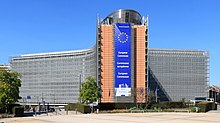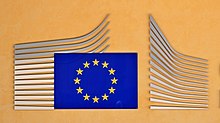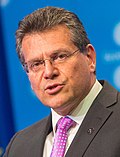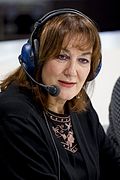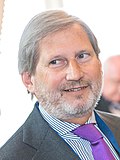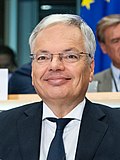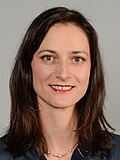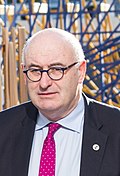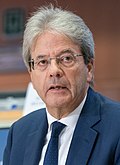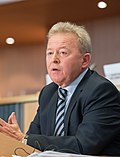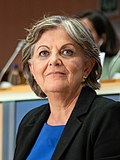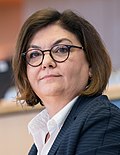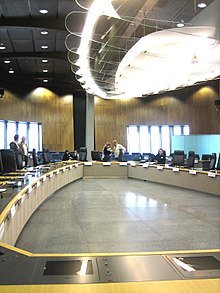European Commission
| State level | European Union |
|---|---|
| position | Supranational executive body (part of the EU political system ) |
| founding | July 1, 1967 |
| Headquarters |
Berlaymont building , Brussels , Belgium |
| Chair | Ursula von der Leyen ( Commission President ) |
| Number of employees | 32,000 |
| Website | ec.europa.eu |
The European Commission (abbreviated EK , often COM in official correspondence ), or EU Commission for short , is a supranational body of the European Union (EU). In the political system of the EU , it primarily performs executive tasks and thus corresponds to the government in state systems. However, it also has other functions: As the “guardian of the treaties”, it monitors compliance with European law by the EU member states and can, if necessary, bring an action against an EU state at the European Court of Justice . In addition, apart from a few cases mentioned in the founding treaties, it has the sole right of initiative in the EU legislative process .
The members of the Commission of the European Union, the EU commissioners , are nominated by the governments of the EU states and elected by the European Parliament . They should be independent in their decisions and only represent the common interests of the Union, not those of their respective EU countries of origin. Her term of office corresponds to the five-year legislative period of the European Parliament, to which she is responsible in accordance with Article 17 , Paragraph 8 of the EU Treaty and which she can vote out at any time.
The commission is headed by the President of the European Commission , currently Ursula von der Leyen , who, among other things, determines the allocation of responsibilities and can also dismiss individual commissioners. The seat of the Commission is Brussels ; some offices are located in Luxembourg .
tasks
As an organ, the Commission is anchored in Art. 17 EU Treaty and Art. 244 et seq. FEU Treaty . It essentially takes on executive functions and is in this respect comparable to the government of a nation-state . With the help of its civil servants, it ensures the correct implementation of European legal acts (i.e. directives , ordinances , resolutions ), implements the EU budget and implements the funding programs that have been decided .
However, the Commission also performs other tasks: In particular, it has the sole right of initiative in the area of EU legislature , i.e. only it can make the formal proposal for an EU legal act and submit it to the Council of the European Union and the European Parliament . The Council and Parliament can amend and expand the Commission's proposals, but they cannot initiate a legislative process of their own accord. Even if the procedure is already running, the Commission still has a certain influence on its development: it can comment positively or negatively on the changes decided by the Council and Parliament, which changes the majorities required for adoption in these two institutions. Pursuant to Art. 293 (2) TFEU, the European Commission can amend or withdraw its proposal at any time during the procedure for the adoption of a legal act of the Union, as long as the Council has not adopted a decision. The Commission can withdraw its legislative proposal, for example, if an amendment intended by Parliament and the Council falsifies the proposal in a way that prevents the achievement of its objectives.
The Commission has a special role in the adoption of implementing provisions for EU legal acts. According to Art. 291 TFEU, these are normally the responsibility of the member states; Due to the high complexity of many regulations, however, they are dependent on the expertise of the Commission. The comitology procedure has therefore been established in which representatives of the national governments, with the participation of Commission officials, decide on the necessary implementing measures.
Furthermore, the Commission has a special role as "guardian of the Treaties": they will ensure that the Member States, the European law , also meet commitments they have made with the EU Treaty and the FEU Treaty. For example, within the framework of state aid controls , it checks whether subsidies from the Member States violate the regulations on the European internal market ; the member states must therefore have such subsidies approved by the European Commission. In the event of legal violations by the Member States, the Commission can initiate infringement proceedings before the European Court of Justice .
The Commission also acts as the EU's representative at international level, particularly in the areas of foreign trade and development cooperation. For example, it represents the EU member states in the World Trade Organization and negotiates the agreements concluded there independently.
Choice and composition
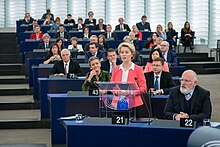

The European Commission currently consists of 27 members who are colloquially referred to as commissioners. Since the EU enlargement in 2004, each of the member states has sent a national as a commissioner. As President of the European Commission, one of the commission members has a management and spokesperson function, otherwise each commissioner is assigned a specific political department . The Commission President has the authority to issue guidelines in the Commission, he appoints the Vice-Presidents and can also independently dismiss individual Commissioners ( Article 17, Paragraph 6 of the EU Treaty). However, decisions are generally made according to the collegial principle , in which all members of the commission have equal rights. The commissioners are not allowed to pursue any other professional activity during their term of office; the governments must respect their independence and must not try to influence them ( Art. 245 TFEU). As the EU's High Representative for Foreign Affairs and Security Policy, one of the commissioners is also Vice-President of the Commission and Chairman of the Council for Foreign Affairs , thus assuming a dual role between the Commission and the Council of the EU .
In principle, the commission is newly appointed every five years after the European elections ( Art. 17 EU Treaty). First of all, the European Council nominates the Commission President by a qualified majority , whereby, according to the EU Treaty , it must take the election result into account. The President of the Commission then needs a first vote of approval from the European Parliament . In the 2014 European elections , the “Spitzenkandidaten” principle was informally agreed between the European parties for the first time , which states that the European Council may only nominate the candidate whose party achieved the best result in the European elections. Accordingly, Jean-Claude Juncker was elected President of the European People's Party . After the European elections in 2019 , however, this principle was given up for the time being with the election of Ursula von der Leyen , who had not previously run as a top candidate. She then declared that she wanted to reform the process together.
Once the presidential candidate has achieved the required majority in parliament, the governments of the member states each propose a commissioner from their own country. The Commission President- designate can, however, reject them. The college then first has to be confirmed by a qualified majority in the European Council. The proposals of the governments are usually accepted without further ado; the commissioners therefore mostly come from the parties that make up the government in their respective countries. The European Council also elects the High Representative for Foreign Affairs and Security Policy ; he is also one of the vice-presidents of the commission. After the nomination of the candidates, the Commission President can independently distribute the remaining departments, and he can also appoint other Vice-Presidents from among the Commissioners. The President of the Commission can change the layout and distribution of the departments at any time.
After the commissioners have been nominated, the responsible committees of the newly elected European Parliament question the candidates in detail in public meetings and issue opinions. Individual nominees (e.g. Alenka Bratušek , László Trócsányi , Sylvie Goulard ) have already failed several times , whereupon their respective countries have to propose new candidates. An election then takes place in Parliament on the Commission as a whole. If this receives the required majority, the Commission is appointed by the European Council and then begins its work.
After the appointment of the Commission, the European Parliament can vote it out again at any time by means of a two-thirds majority vote of no confidence ( Art. 234 TFEU). The High Representative, who is elected together with the other members of the Commission, can also be dismissed by the European Council ( Art. 18 EU Treaty). Furthermore, every commissioner must resign if requested to do so by the commission president. In all these cases, the appointment of new commissioners follows the same procedure as for a regular replacement, with the term of office of the newly appointed commissioners only lasting until the end of the current legislative period of the European Parliament.
According to the Treaty of Nice , the number of EU commissioners should have been smaller than that of the member states from the 2009 European elections . The Treaty of Lisbon , which has been in force since December 1, 2009 , actually provides that from 2014 only two thirds of the member states can appoint a commissioner ( Art. 17 (5) EU Treaty). However, the European Council can decide on a different composition of the Commission. During the ratification process, the proposed downsizing met with criticism, especially in some smaller countries, and was one of the reasons why the first referendum held in Ireland on the treaty failed. The European Council therefore assured Ireland in December 2008 that it would refrain from reducing the size of the Commission when the Treaty entered into force. A corresponding decision was subsequently taken by the European Council on May 22, 2013, so that each of the then 28 member states can continue to appoint a commissioner.
legitimacy
The European Commission's appointment process was often seen as part of the so-called “ democratic deficit of the European Union ”, as it was originally only indirectly legitimized by the governments of the member states. In fact, when the Commission was founded, it was seen primarily as an independent, technocratic institution, which, like a central bank, should as far as possible be free from the influence of daily political disputes. With the increasing expansion of the policy fields of the European Union and the associated politicization of the Commission, however, the demands for better legitimacy of the Commission also increased. Correspondingly, in the Maastricht Treaty in 1992 and in the Treaty of Amsterdam in 1997, the European Parliament's right to have a say was considerably expanded. Since then, it has played a central role in the election of the commission, which cannot be appointed without its consent and can be voted out of office at any time. According to Article 17 , Paragraph 8 of the EU Treaty , the Commission is now only politically responsible to Parliament.
In the European Convention in 2002 , which worked out the draft of the EU Constitutional Treaty, options such as an election by the European Parliament alone (i.e. without the involvement of the Council) or even a direct election of the Commission President by the EU population were discussed. However, these suggestions could not prevail in the end. In addition to these democratic-theoretical objections, the Commission's communication work is also increasingly criticized.
Acting Commission
After the European elections in 2019 , Ursula von der Leyen was elected as the new President of the Commission, who took office on December 1, 2019 together with her Commission, consisting of a coalition of EPP , S&D and RE :
Way of working
The rules governing the organization of the commission are set out in its rules of procedure . The commissioners' meetings usually take place once a week on Wednesday mornings in Brussels ; the commissioners can also arrange additional appointments. The College of Commissions also meets there during the weeks when the European Parliament holds plenary sessions in Strasbourg . The meetings are chaired by the Commission President or, in his absence, by the First Vice-President of the Commission . They are not public, but minutes of them are published.
In the meetings, resolutions are passed with a simple majority; in the event of a tie, the vote of the commission president decides. Most decisions are made outside of the meetings in a written procedure , in which all committee members receive a proposal in writing and this is deemed to have been approved, unless objections are raised within a certain period of time. On less important issues, the Commission can delegate decisions to individual Commissioners or to staff in the Directorates-General . In any case, however, the principle of collegiality applies , so decisions are always formally made by the Commission as a whole.
Various Directorates-General report to the Commission and they perform functions similar to those of the ministries at national level. In contrast to ministries, however, the portfolios of the commissioners are sometimes not exactly the same as those of the directorates-general, so that in some cases one commissioner can be assigned several directorates-general or one directorate-general works with several commissioners. There are service providers for internal administration , such as the legal service and the translation service, which are organized on an equal footing with the directorates-general. For the implementation of certain Community programs, the European Commission can also make use of what are known as executive agencies , which are only set up for certain activities and for a certain period of time. An important administrative post within the EU is the Secretary General of the European Commission , an EU official who administratively manages the administrative apparatus.
Each commissioner also has his own staff (the so-called cabinet) of six to nine political officials. The heads of cabinet prepare the agenda for the meetings of the college and are already coordinating with each other: There is agreement among the departments on the so-called "A points" (A articles) ; they have a quorum without extensive consultation. The so-called "B points" (B articles), on the other hand, require detailed discussion in the college.
The President of the Commission is assisted by a Secretary General for the coordination between the various departments, the organization of the meetings and the publication of the resolutions. The general secretariat of the European Commission has the same organizational status as the other general directorates and services .
The Commission also has missions abroad , the so-called delegations of the European Union , which report to the High Representative . You take on functions such as the external presentation of EU politics, the preparation of analyzes for the Commission and, if necessary, negotiations within the framework of a given mandate. They form the basis for the European External Action Service . In addition, the Commission has representative offices in all EU Member States, which are often housed together with information offices of the European Parliament in a so-called House of the European Union .
The internal working languages of the European Commission are English , French and German . Working documents are translated into all three languages. However, internal meetings are often only conducted in English.
history
The three commissions until 1967
The European Commission has its origins in the High Authority , which was created under the Paris Treaty establishing the European Coal and Steel Community in 1952, but which has already been referred to as the Commission. The High Authority had its seat in Luxembourg and had very extensive own decision-making rights in the area of the coal and steel industry . It only required the approval of the Council of Ministers in certain cases - in particular when decisions by the High Authority had an impact on other sectors .
The High Authority was composed of nine members, eight of whom were appointed by the six ECSC states and the ninth was freely elected by the other eight . Decisions were made with a simple majority of votes. The High Authority chose its own President; the first president was Jean Monnet , the intellectual creator of the Schuman plan that led to the creation of the ECSC.

With the founding of the European Economic Community (EEC) and the European Atomic Energy Community (Euratom) in 1958, two new commissions were set up which now officially bore this name. The structure of the new commissions was essentially modeled on the High Authority, with the Euratom Commission only consisting of five members. However, the member states now had significantly greater influence: They appointed all commissioners and also the commission president himself, and the commissions hardly had any decision-making powers of their own without the consent of the Council of Ministers. Walter Hallstein was appointed the first President of the EEC Commission . As Foreign Policy Secretary of State under Konrad Adenauer, he had made a significant contribution to the establishment of the communities on the German side.
During the 1970s there were violent conflicts over the influence that the EEC Commission would have on the further development of European integration. While the French President Charles de Gaulle wanted to subordinate the Commission completely to the Council of Ministers with the so-called Fouchet plans , Walter Hallstein aimed to strengthen the Commission by introducing financial resources that would make the Commission independent of the member states' annual membership fees. These conflicts contributed to the empty chair crisis of 1965/66 in which France tried to assert itself against the other member states. De Gaulle's plans ultimately failed, but Hallstein could not achieve his goals either; rather, in the Luxembourg Compromise of 1966, the Commission's powers were slightly curtailed. Under pressure from France, Hallstein declared in 1967 that he did not want to run for a new term.
With Hallstein's resignation, a first structural reform of the three communities coincided, whose institutions have now been merged. On July 1, 1967, the High Authority of the ECSC and the Commissions of the EEC and Euratom were merged into the European Commission within the framework of the EC Merger Treaty . The new Commission was now responsible for all policy areas of the European Communities .
| ECSC | EEC | EURATOM | ||||
|---|---|---|---|---|---|---|
| No. | High Authority | Term of office | Commission | Term of office | Commission | Term of office |
| 1. | Monnet | 1952-1955 | ||||
| 2. | Mayer | 1955-1958 | ||||
| 3. | Finet | 1958-1959 | Hallstein I. | 1958-1962 | Armand | 1958-1959 |
| 4th | Malvestiti | 1959-1963 | deer | 1959-1962 | ||
| 5. | Del Bo | 1963-1967 | Hallstein II | 1962-1967 | Chatenet | 1962-1967 |
| 6th | Coppe | 1967 | ||||
The European Commission from 1967
Although the introduction of EC own funds called for by Hallstein was finally resolved at the summit in The Hague in 1969 , the European Commission lost its influence on the integration process in the 1970s. The main initiatives now came from the European Council , while the Commission became more and more an executive body. The European Monetary System , initiated in 1977 by Commission President Roy Jenkins , was only able to establish itself after the German Chancellor Helmut Schmidt and the French President Valéry Giscard d'Estaing took up the idea and made it their own.

Only after overcoming the so-called euro sclerosis -Crisis 1984, the European Commission was more involved again in the integration process. The French Jacques Delors , who was appointed Commission President in 1985 and held this post until 1995, became a key figure . Delors initiated the internal market project , with which the member states committed themselves in the Single European Act 1986 to complete the European internal market . To this end, the Commission developed an extensive work program that was implemented by 1993. The Commission also proposed the so-called Delors Plan , which laid the basis for the European Monetary Union agreed in the Maastricht Treaty in 1992 .
The subsequent EU treaty reforms in Amsterdam in 1997 and Nice in 2001 did not give the Commission any additional powers, but reorganized its composition and internal functioning. In this way, the powers of the Commission President in the selection and distribution of tasks of the Commissioners have been strengthened. In addition, a downsizing of the Commission was discussed for the first time: as a result of the enlargement of the EU it had grown to twenty members by 1995, since the five largest of the 15 member states were each allowed to provide two commissioners. The planned EU eastward expansion should add more members. In order to maintain the Commission's ability to act in the face of this growth, it was agreed in the Treaty of Nice that from 2005 each Member State should only have one Commissioner; From the 27th member onwards, the number of commissioners should be smaller than that of the states.
The Commission Presidents who followed Delors could not continue his impetus for a more active role for the European Commission. Rather, it came increasingly into the focus of public criticism of the EU, which is often understood as remote from the citizen and undemocratic . Towards the end of her term of office, the Santer Commission (1995–1999) also got caught up in a corruption scandal involving Commissioner Edith Cresson , who had hired an unqualified employee who was friends. After the European Parliament threatened with a motion of censure, the Commission resigned on March 16, 1999.
Santer's successors Romano Prodi (1999–2004) and José Manuel Barroso (2004–2014) are often considered to be rather weak Commission presidents. The appointment of the first Barroso Commission was also accompanied by another conflict, as the Commissioner Rocco Buttiglione , proposed by Italy , attracted attention through controversial remarks on homosexuality and the roles of women before the Commission was confirmed by the European Parliament . Parliament then threatened to refuse the Commission's approval. Eventually Buttiglione resigned from office.
The Lisbon Treaty , which came into force on December 1st, 2009, brought various changes for the European Commission. In particular, the offices of the Foreign Commissioner and the High Representative for the Common Foreign and Security Policy (CFSP) have been merged, so that in the area of the CFSP there is also the possibility of better dovetailing between the Commission and the Council. The policy areas in which the Commission can act have also been expanded. In particular, police and judicial cooperation in criminal matters , which previously was exclusively subject to the Council of the EU , was transferred to the area of the ordinary legislative procedure , so that the Commission was given the same powers here as in other areas.
In January 2019, the European Commission published its Sustainability Report Fiscal Sustainability Report 2018 to the fiscal situation of the European Union .

| No. | Commission | Term of office |
|---|---|---|
| 1. | Rey | 1967-1970 |
| 2. | Malfatti | 1970-1972 |
| 3. | Mansholt | 1972-1973 |
| 4th | Ortoli | 1973-1977 |
| 5. | Jenkins | 1977-1981 |
| 6th | Thorn | 1981-1985 |
| 7th | Delors I | 1985-1989 |
| 8th. | Delors II | 1989-1993 |
| 9. | Delors III | 1993-1995 |
| 10. | Santer | 1995-1999 |
| 11. | Prodi | 1999-2004 |
| 12th | Barroso I | 2004-2010 |
| 13th | Barroso II | 2010-2014 |
| 14th | Juncker | 2014-2019 |
| 15th | von der Leyen | 2019-2024 |
salary
The basic wage of an EU commissioner is 112.5% of the highest EU civil servant (grade 16), 19,909.89 euros per month without allowances. The President receives 138% (EUR 24,422.80), Vice-Presidents 125% (EUR 22,122.10 ) and High Representatives 130% (EUR 23,006.98). This salary is taxed, the taxes flow back into the EU budget. In addition, the commissioners receive a residence allowance of 15% of the basic salary as well as an expense allowance of 607 euros (Vice President 911.38 euros, President 1418.07 euros). The income of the commissioners is thus in the upper range of what government members in the large EU member states usually earn; however, national government members sometimes receive other forms of additional remuneration. After their term of office, the commission members from the age of 65 receive a pension based on the length of their term of office. It amounts to 4.275% for each year of office, but not more than 70% of the last basic salary.
Bureaucratic apparatus
In 33 general directorates, the commissioners work with an administrative apparatus of EU officials , which, however, with around 32,000 employees is significantly smaller than that of national governments (for comparison: the city of Hamburg alone employs over 60,000 officials). Of the civil servants, 42.2% are female, with over 50% women being represented in all age groups under 50. However, women in middle and higher ranks are represented significantly less. Only 25% of senior civil servants were women at the end of 2014 (1995: 4%). It was therefore a goal of the Juncker Commission to increase their share in middle and higher ranks to 40%.
Commission employees receive their salary according to a 16-stage division (grade, divided into the assistant career path “AST” and the administrator career “AD”), each grade in turn has up to five age levels. The classification increases by one age group approximately every two years. After the fifth age group, the group is assigned to a higher grade. A tax is withheld from the gross salary, which flows back into the EU budget and amounts to between 8 and 45%, plus a solidarity contribution of 7%. The gross salary in the first age group for Grade / AD 1 is 2,675.40 euros per month, for AD5 4,384.38 euros, for AD14 13,322.22 euros and for AD16 17,054.40 euros.
Secretaries are divided into grades 1–6, assistants into grades 1–11, and (political) civil servants begin at grade 5 (“AD5”). For department heads ("head of unit") there is a classification from at least grade 9. Directors are classified with at least grade / AD 14, general directors at least grade / AD 15.
See also
- European Commission work program
- List of EU commissioners
- Representation of the European Commission in Germany
literature
- Hans-Peter Duric: Structure, structure and functionality of the European Commission . In: Journal for Customs and Excise Taxes 1997, p. 296 ff.
Web links
- Official website of the Commission
- Files of the European Commission can be viewed in the EU Historical Archives in Florence
- Historical Archives of the European Commission
- European Commission on Twitter
Individual evidence
- ^ Commission Staff . July 2019.
- ↑ Judgment of the Court of Justice in Case C ‑ 409/13. April 14, 2015. Retrieved May 29, 2017 .
- ↑ a b See Treaty on European Union in the version of the Treaty of Lisbon.
- ↑ Conclusions of the Presidency for the European Council in December 2008 (PDF; 194 kB).
- ↑ consilium.europa.eu Decision (ER) May 22, 2014.
- ↑ register.consilium.europa.eu Draft decision of the ER.
- ↑ Guido Thiemeyer , The Democratic Deficit of the European Union. Historical perspectives , in: European History Topic Portal (2008).
- ↑ See Spiegel online , July 3, 2002: EU Parliament should elect Prodi's successor .
- ↑ See for example: Robin Kiera: The game with the buck. Why the European Commission needs a strategic communication concept, Kassel: Thesis 2010, ISSN 1434-1131 , pp. 19-21 under the following link intern.thesis.de .
- ↑ https://ec.europa.eu/commission/sites/beta-political/files/allocation-portfolios-supporting-services_en.pdf
- ↑ WORLD: EU Commission: Von der Leyen names three powerful deputies . September 10, 2019 ( welt.de [accessed September 10, 2019]).
- ↑ Tobias Kaiser: EU Commission: Von der Leyen relies on climate and digital . September 10, 2019 ( welt.de [accessed September 10, 2019]).
- ↑ See decision of the Commission to amend its rules of procedure with the complete text of the rules of procedure in the annex, November 15, 2005.
- ↑ See European Commission: The weekly meetings of the commissioners.
- ↑ Overview of the minutes of the committee meetings on the Commission's homepage.
- ↑ Cf. European Commission: How does the Commission take its decisions? ( Memento from June 28, 2013 in the Internet Archive ).
- ^ Homepage of the General Secretariat of the European Commission .
- ↑ See the homepage of the Representation of the European Commission in Berlin and the Representation of the European Commission in Vienna .
- ↑ Die Bundesregierung, July 2013: Language regulation in EU organs .
- ↑ Cf. Gabriele Clemens et al., History of European Integration , Paderborn 2008, p. 102 f.
- ↑ See Gabriele Clemens et al., History of European Integration , Paderborn 2008, p. 104.
- ↑ See Gerhard Brunn, Die Europäische Einigung von 1945 bis today , Bonn 2004, p. 85.
- ↑ Cf. Gabriele Clemens et al., History of European Integration , Paderborn 2008, pp. 132 and 135.
- ↑ Cf. N. Piers Ludlow, "A supranational Icarus: Hallstein, the early commission and the search for an independent role", in: Antonio Varsori (Ed.), Inside the European Community: actors and policies in the European integration 1957– 1972 , Baden-Baden 2006.
- ↑ Cf. Gerhard Brunn, Die Europäische Einigung von 1945 bis today , Bonn 2004, p. 147.
- ↑ See Gerhard Brunn, Die Europäische Einigung from 1945 to today , Bonn 2004, p. 174.
- ↑ See Gerhard Brunn, Die Europäische Einigung von 1945 bis today , Bonn 2004, pp. 221–223.
- ↑ Cf. Gerhard Brunn, Die Europäische Einigung von 1945 bis today , Bonn 2004, pp. 239 f. And 251 f.
- ↑ Cf. Gabriele Clemens et al., History of European Integration , Paderborn 2008, p. 243.
- ↑ See Gerhard Brunn, Die Europäische Einigung von 1945 bis today , Bonn 2004, p. 303 f.
- ↑ cf. B. Salzburger Nachrichten, June 18, 2009: Only a weak president is a good president .
- ↑ Süddeutsche Zeitung , October 30, 2004: Rocco Buttiglione: “I offer my retreat” ( Memento from January 19, 2010 in the Internet Archive ).
- ↑ https://ec.europa.eu/info/publications/economy-finance/fiscal-sustainability-report-2018_en , accessed on November 26, 2020.
- ↑ zeit.de accessed on November 5, 2019.
- ↑ a b Regulation (EEC) No. 422/67 5/67 / Euratom of the Council of 25 July 1967 on the regulation of the remuneration of the President and the members of the Commission as well as for the President, the judges, the advocates-general and the Chancellor of the Court of Justice in the consolidated version of May 1, 2004 , EUR-Lex .
- ↑ Base salary of grade 16, third step is € 17,697.68: European Commission: Officials' salaries - accessed 19 March 2010.
- ^ Council decision of 1 December 2009 on the conditions of employment of the High Representative of the Union for Foreign Affairs and Security Policy . EUR-Lex.
- ↑ Explanation of the salaries on the homepage of the European Commission according to Regulation 422/67 / EEC (PDF).
- ↑ Claus Hecking: European Union: Myth 5: The bureaucracy in Brussels is expensive and inefficient. In: Zeit Online. May 19, 2014, accessed May 20, 2016 .
- ↑ without author: Gender Balance - Hitting Targets . The Companion to the European Commission. European Voice February 2015, p. 54.
- ↑ without author: European Commission salaries . The Companion to the European Commission. European Voice February 2015, p. 57.


